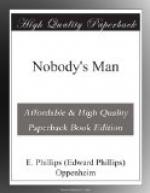Miller gnawed his moustache for a moment.
“Then I was probably unpopular there,” he said. “I have to tell the truth. Sometimes people do not like it.”
The dinner was simply but daintily served. There were wines of well-known vintages and as the meal progressed Dartrey unbent. Eating scarcely anything and drinking less, the purely intellectual stimulus of conversation seemed to unloose his tongue and give to his pronouncements a more pungent tone. Naturally, politics remained the subject of discussion and Dartrey disclosed a little the reason for the meeting which he had arranged.
“The craft of politics,” he pointed out, “makes but one inexorable demand upon her followers—the demand for unity. The amazing thing is that this is not generally realised. It seems the fashion, nowadays, to dissent from everything, to cultivate the ego in its narrowest sense rather than to try and reach out and grasp the hands of those around. The fault, I think, is in an over-developed theatrical sense, the desire which so many clever men have for individual notoriety. We Democrats have prospered because we have been free from it. We have been able to sink our individual prejudices in our cause. That is because our cause has been great enough. We aim so high, we see so clearly, that it is rare indeed to find amongst us those individual differences which have been the ruin of every political party up to to-day. We have no Brown who will not serve with Smith, no Robinson who declines to be associated with Jones. We forget the small things which are repugnant to us in a fellowman, because of the great things which bind us together.”
“To a certain extent, yes,” Tallente agreed, with some reserve in his tone, “yet we are all human. There are some prejudices which no man may conquer. If he pretends he does, he only lives in an atmosphere of falsehood. The strong man loves or hates.”
They took their coffee in their host’s very fascinating study. There was little room here for decoration. The walls were lined with books, there were a few choice bronzes here and there, a statue of wonderful beauty upon the writing table, and a figure of Justice leaning with outstretched arms over the world, presented to Dartrey by a great French artist. For the rest, there were comfortable chairs, an ample fire, and a round table on which were set out coffee and liqueurs of many sorts.
“You will find that I am not altogether an anchorite,” Dartrey observed, as they settled into their places.
“I am a lover of old brandy. The ’68 I recommend especially, Tallente, and bring your chair round to the fire. There are cigars and cigarettes at your elbow. Miller, I think I know your taste. Help yourself, won’t you?”




